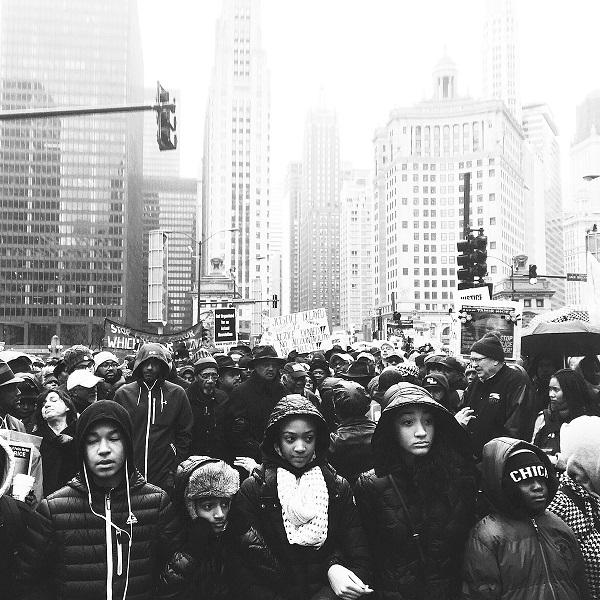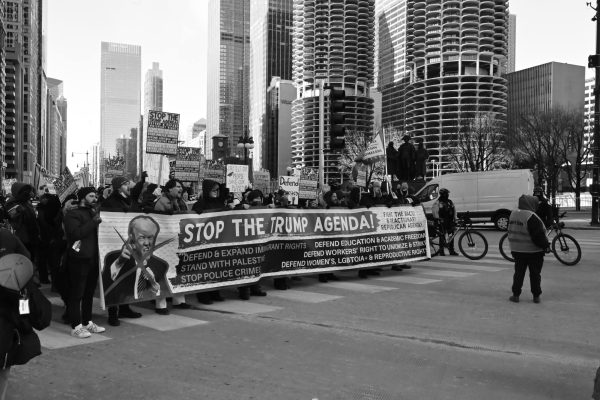16 Shots: Laquan McDonald’s Murder Exposes Corruption in Chicago

Children lead the rally on Nov. 27.
The police dash-cam video showing officer Jason Van Dyke fatally shooting Laquan McDonald took 400 days to be seen by the public.
If it wasn’t for a lawsuit by part-time journalist Brandon Smith, there would be no outrage and Van Dyke would not be charged with murder.
The power that police wield over the public is shown by the initial police explanation of the shooting in October 2014. The seven police officers — who have still not been named — that arrived on the scene, alongside Van Dyke, alleged that McDonald lunged at officers after being asked to drop the knife he was carrying. Officers were tailing McDonald and requested additional officers armed with tasers.
This was clearly not the case in the dash-cam video — as McDonald was at least a car lane’s distance away from the officers and walking away.
This is the first step in systemic police brutality: assert that the victim was being aggressive towards officers. When this is supported by the officers on the scene it is usually enough to wrap up a case. If any of these officers were to change their initial story it would be considered perjury.
According to the manager of a Burger King located in front of the shooting scene, police arrived minutes after the shooting, asked to see the restaurant’s surveillance video system and deleted an 86-minute portion of video. The restaurant manager also testified to a grand jury that the FBI took the entirety of the surveillance footage. State’s Attorney Anita Alvarez and police Superintendent Garry McCarthy both claimed that there was no tampering but there were technical difficulties with the Burger King surveillance video. The remaining video showed officers looking intently at the surveillance footage.
In April, Mayor Rahm Emanuel echoed the statements of Alvarez saying that the police and FBI were rightfully withholding the dash-cam video from the public while they conducted their rigorous, intensive, and meticulous investigation. Releasing the video would jeopardize a fair trail—they claimed. Meanwhile, Emanuel won the mayoral election that would surely be affected by the release of such a horrific video.
In June, McDonald family lawyers saw the dash-cam video for the first time and the city quickly offered a $5 million settlement — before the McDonalds had even filed a lawsuit. The settlement terms included that the video remain confidential.
Meanwhile, the Chicago Police Department rejected 15 Freedom of Information Act requests to release the dash-cam footage of McDonald’s shooting, citing that there was an ongoing investigation. Smith had to file a lawsuit against the CPD to have the video released.
After a judge ruled that the video must be released, the city suddenly changed its tone. Van Dyke was pulled off of desk-duty and charged with first-degree murder on the day the video was to be released.
All of these factors come together to prove that Chicago is a hotbed for political corruption. No official is in the position to gain anything from the release of the Laquan McDonald shooting video. But they have everything to gain in protecting the status quo and allowing the systemic racism and abuse of the policing structure to continue the way it is now.
But we all must recognize the bigger picture here. According to DailyKos.com, Chicago has paid out over $521 million in legal fees and settlements from incidents of police violence since 2004.
The city of Chicago officials make it very clear that paying off the victims of police violence is more important than putting an end to systemic police brutality.
Your donation will support the student journalists of Northeastern Illinois University's The Independent, either in writers' payment, additional supplies and other items of note. Your contribution will allow us to purchase additional equipment for writers/photographers/illustrators and cover our annual website hosting costs.





